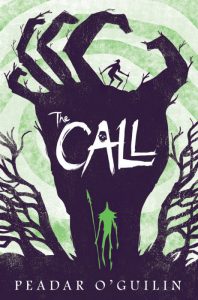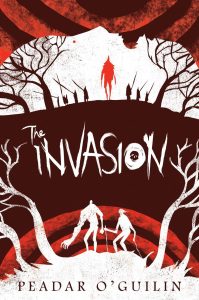THE CALL by Peadar O’Guilin (Book Review)
 At a convention recently, I heard O’Guilin explain how he didn’t realise he was writing Young Adult fiction when he started as an author; that this was something his agent explained to him; and he discovered himself to be that rarity: a male author in a predominantly female genre. The Call is the first O’Guilin book I’ve read, recommended by a friend after the sequel, The Invasion, was nominated for a Hugo award.
At a convention recently, I heard O’Guilin explain how he didn’t realise he was writing Young Adult fiction when he started as an author; that this was something his agent explained to him; and he discovered himself to be that rarity: a male author in a predominantly female genre. The Call is the first O’Guilin book I’ve read, recommended by a friend after the sequel, The Invasion, was nominated for a Hugo award.
The Call certainly has some of the key YA elements – namely, a teenage female protagonist and a slow-burning romance. However, its lively writing and gripping plot avoids any condescension to its publisher-defined YA audience and ensures it has appeal enough to entertain those who are some way beyond their teenage years.
The premise brings elements of The Hunger Games, Battle Royale, Harry Potter and even Narnia into a heady mix. A near-contemporary Island of Ireland has been cut off for decades from the rest of the world by a ghostly fog and subjected to the terror of the Fae, or Sidhe – not Tolkien’s noble elves, but a wholly malevolent magical race more reminiscent of Pratchett’s Lord and Ladies or Graham Austin-King’s The Wild Hunt.
All adolescents in this fogbound island are subject to the Call. At some totally unpredictable point in their teenage years, they will be transported from this world into the parallel world of the Sidhe. While absent for only three minutes of normal time, they are subjected to a day-long hunt to the death through the Sidhe’s hostile terrain with grotesquely transformed flora and fauna striving to betray them. The Call comes without warning, and the vast majority of children come back not just dead, but transformed horribly by the Sidhe’s ability to distort and reshape the human form. To counter this, the beleaguered authorities of a now united Ireland create training schools to prepare the young for the ordeal in the hope that they can increase the meagre proportion who survive.
So, we have the combination of training/boarding school story, with an almost Battle Royale threat, haunted by the cryptic ways of the Sidhe.
Our protagonist is Nessa, and Nessa is different. Crippled at a young age by polio, her chances of outrunning the Sidhe in a day-long race are – to say the least – remote. O’Guilin observes this neatly:
“The guard stares at her legs and can’t keep the pity off his face. Didn’t your parents love you enough to kill you?”
But disability does not stop her preparing for the Call harder than any of her peers.
O’Guilin predominantly gives us Nessa’s point of view, but we get short ventures into her peers’ points of view, mostly in named chapters where they are Called and we witness their struggles and their fates at the hands of the laughing Sidhe. Some few survive, but rarely without some kind of change. Most do not. Despite the best efforts of the trainers, the Call is a brutal cull, and what is returned is sometimes not even fit for burial. Yet O’Guilin keeps a light touch, dancing around these gruesome fates in a delicate balance between conveying horror and inciting disgust.
 There are still the usual kind of YA boarding school factions, though the Call hanging over the entire school population adds a layer of existential threat not normally seen in Enid Blyton’s school stories. There are bad guys amongst the pupils, their leader a comfortably easy hate for the reader, as much perhaps as Draco Malfoy – though whether Conor Geary achieves any redemption… well, you’ll have to read the book to find out.
There are still the usual kind of YA boarding school factions, though the Call hanging over the entire school population adds a layer of existential threat not normally seen in Enid Blyton’s school stories. There are bad guys amongst the pupils, their leader a comfortably easy hate for the reader, as much perhaps as Draco Malfoy – though whether Conor Geary achieves any redemption… well, you’ll have to read the book to find out.
Through hideous cross-countries Nessa prepares as best she can for a battle where we know her handicap must prove fatal, no matter how adept she is at fashioning crutches from stray branches. I loved Audrey Niffenberger’s debut The Time Traveller’s Wife and there is something similar in the way that O’Guilin’s characters are snatched naked into another world (or in Niffenberger’s protagonist Henry’s case, another time) leaving only their clothes to crumple into a pile behind them. Henry, like Nessa, knew the need to move fast – to run, his first survival impulse and his enduring obsession of maintaining the fitness of the long-distance runner. The tragedy of The Time Traveller’s Wife is when there comes a point where he cannot run, when he must lie naked in the past and accept his fate. There is that same poignancy to Nessa’s plight. You know she cannot survive, that there is no preparation that can equip her for this race, and yet we still cheer her all the harder.
Alongside the compelling central novum, O’Guilin weaves an intriguing tapestry of subplots as Nessa’s tale becomes entangled in wider issues. The incursions of the Sidhe, the strange stone atop the hill, and in the realm of the Sidhe, Dagda the dozen king and his Sidhe hordes celebrate a hunt from which even death cannot separate them.
There are many lines that caught my eye:
- Thinking of her love interest, Nessa remembers “the time she accidentally kissed him for ten full minutes.” Ten full minutes – some accident!
- Or Taaft the grizzled American PT instructor who has “an angry face, made of toothaches and crab apples.”
- In another line I was so struck by the theme “Winding the clock of evolution and letting it go its own way” that I have just realised I missed an important clue planted in plain sight.
It is perhaps in the fates of the returned that O’Guilin shows the exquisite cruelty of the Sidhe’s imagination, or even his own. Those who return alive from the Call are always changed: most often in body, in strange and hideous ways, but also in spirit – and sometimes both.
As the reader waits for Nessa to take her chance with fate, events in the real world take a distracting turn, for death comes to people not just in the land of the Fae. The solution with which O’Guilin ties up his denouement manages that double hit of being both a complete surprise and completely satisfying.
All in all, The Call is an excellent addition to the shelves of wider speculative fiction, not just that region where it overlaps so often with Young Adult.
